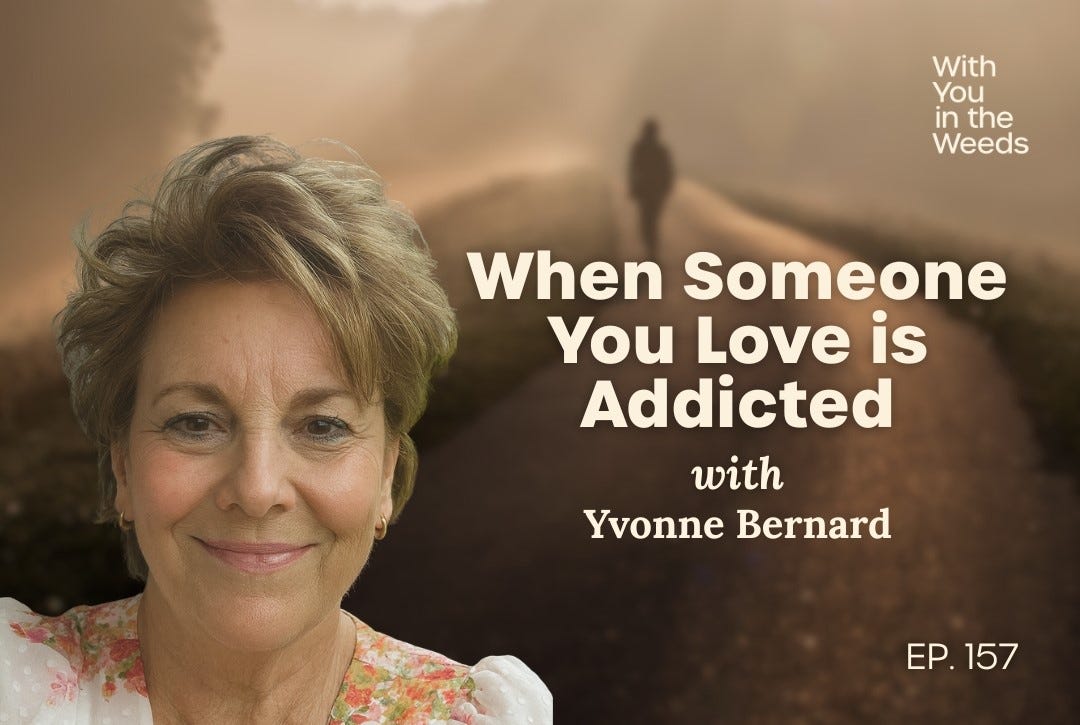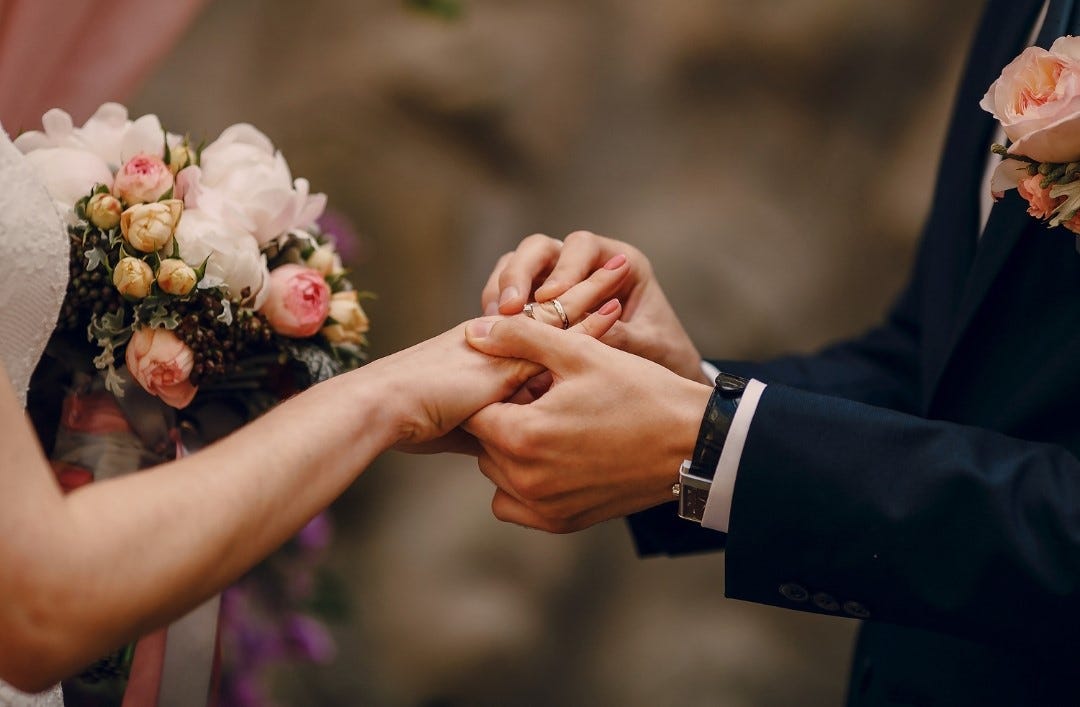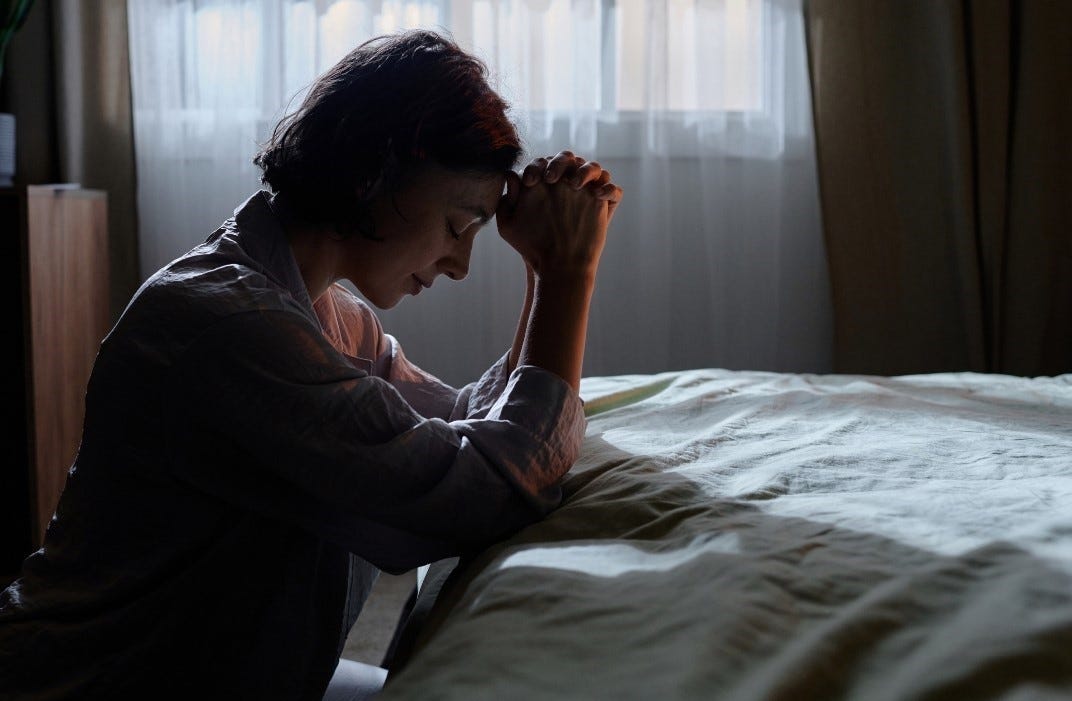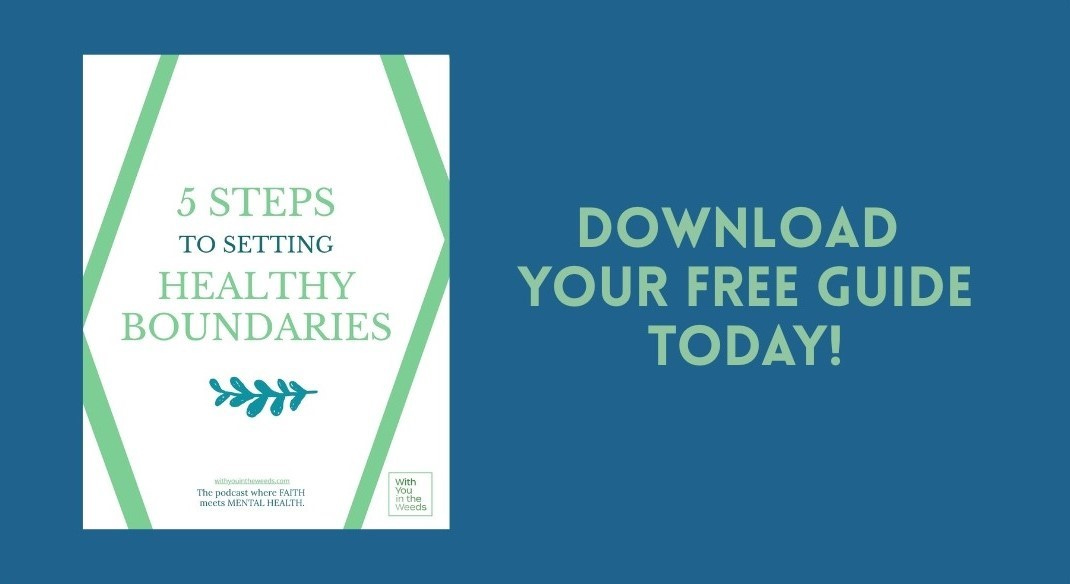When Someone You Love Is Addicted
How healthy boundaries bring healing
What do you do when the person you love most is trapped in addiction—and you realize you’re powerless to change them?
In this enlightening episode of our Dealing with Your Addictions series, Lynn and special guest Yvonne Bernard share the raw truth about addiction and codependency that many Christians are not able to say out loud. The ‘crazy cycle’ is real in a home or a marriage where there is addiction. And loving someone who is addicted takes grace and wisdom that can only come from God.
You’ll hear the truth about:
How addiction is rooted in personal history, not marriage
Why it’s not only the addict who needs to change
5 myths Christians believe about loving someone with addiction
The only way to have lasting peace
If you’ve ever felt stuck in the crazy cycle of loving an addict, this hope-filled conversation is for you.
Highlights of Lynn’s Conversation with Yvonne
Lynn: When I first started as a counselor, I had a lot to learn. Some of my earliest clients were Christian women who were just beginning to face some difficult realities in their lives. For example, they had discovered that their husband was secretly using pornography or had been unfaithful. Sometimes there was financial infidelity which led to broken trust.
I realized that these were not ‘logic’ problems. They were emotional, spiritual, and relational problems. These women needed advice about codependency, control, fear, manipulation, addiction, mood disorders, childhood trauma, trauma responses, attachment issues, and spiritual warfare. God knew that I needed help!
It was at this point that I was introduced to my guest for today, Yvonne Bernard. She started a support group for women in our church who were dealing with some of these issues. I asked her to help me understand codependency and addiction better and I’ve learned so much from her. Yvonne, thank you so much for joining us. It’s a privilege to have you on the podcast today!
Yvonne: Thank you for inviting me, Lynn! In my early 20s, I had realized that life wasn’t what I thought it was going to be. I asked the Lord to use whatever I was facing to help other people. I didn’t want to go through it just for myself. Now, almost 50 years later, I can see that God has used my life to help other women.
Lynn: That’s where my heart is as well. We’re in the middle of our addiction series, and one thing that we need to address is that addiction impacts the whole family and particularly a marital relationship.
Tell me a bit about your early life, because one of the things you shared with me when we first met was, “It all starts the day you come home from the hospital”. As Christian psychologist Dan Allender says, “Your family is your first classroom”.
Yvonne: I grew up in a Christian home in a very rural community, attended church every Sunday, and really did learn to love the Lord. I accepted Jesus as my Savior as a small child. I had a very close-knit family. My grandmother prayed for each of her grandchildren every day.
My husband grew up in the country. His family owned a tavern. His dad was an alcoholic. His mom tried to set some boundaries, but she ended up being an alcoholic as well. He didn’t attend church, and his home had no religious values at all.
Lynn: So your homes were very different. How did you meet?
Yvonne: I’ve run over this question in my mind many times, especially early on in my marriage. How did I end up with an addict in my life? I will say that I was very young and naïve when we met. We were both working at a hospital at the time. He was very charming and good-looking. We didn’t date very long before getting engaged and then married.
I had no clue what alcoholism was and the effects it had on a family. I tell women today to look carefully at the family that your potential spouse is coming from. Go in with informed consent. Because if they have dysfunction and trauma in their background, you’re going to run into issues in your marriage.
Lynn: Okay, so you get married, you’re naïve, you realize pretty quickly that things are not the ideal that you had hoped for. Talk me through what happened after that.
Yvonne: We did a lot of moving early on. My husband was never happy where he was at. On the surface it seemed like we were moving up, but it was about an emptiness that he couldn’t fill. And it was a distraction for me too. It kept me from looking deeper.
Lynn: This takes me back to when you were first mentoring me 18 years ago. You said, “Lynn, addiction is not a marriage issue.” And I couldn’t understand that because the lens I was using to view it, which I think a lot of people do, is trying to find the causes of addiction in the marriage.
Yvonne: Sometimes parts of it can be related to marriage. But the issues start long before you were ever part of this person’s life. My husband wasn’t using porn or alcohol yet, but he just could not connect. He would come home from work and sit in a chair and check out. He was depressed.
Lynn: Talk about what happens next because there’s a revelation that you encounter about Ron’s addiction and that unravels everything.
Yvonne: We moved here to Columbia when our kids were in early grade school. There was a speaker in town for Christian men who gave a talk about the dangers of porn. After hearing that, Ron suggested we go out to eat, so we went to a restaurant, and he confessed that it was an issue in his mind.
That confession started him down the path of looking into his childhood a little, but not very far. Our daughter got pregnant her senior year of high school. We are very thankful for our granddaughter who now has two children of her own. But it was very traumatic when it happened. That started Ron on a downward spiral.
Right before our 25th anniversary, he went to a physician and confessed that he had been using drugs at work. The physician told him to get treatment, or he would call the state. Ron came home and told me what had been going on. Two days later, he left for treatment. I had no clue this was going on, which is kind of astounding. But when it comes to addiction, the secrecy is part of the survival. You do whatever you have to do to meet your needs.
Lynn: So that really blew up your world. What happened after that?
Yvonne: Yes, it did. I was glad to get him out of the house at the time. I had a friend who had been struggling with addiction herself and was seeing a counselor. So I called and made an appointment with the counselor. That was a big step for me, to admit I needed help.
It wasn’t just Ron who had issues. I had issues too. They were just more subtle. The counselor and I went over my childhood. I was the oldest child in the family and mentioned that my mom had depression, and I had been the caretaker for my three siblings when she was in the hospital. I thought of them as ‘my children’. Looking back, I could see why I had the patience to be with Ron.
My role in the story was the enabler, the codependent person. But I saw that I could stand up for myself. I moved my thinking from a victim mentality, feeling powerless and helpless, to realizing I have agency, I can make choices, and I can walk in the light of truth. I’m not owning what my husband is doing, but I’m owning the subtle ways that I’m allowing him to have power.
Another good thing that I’ve learned is that I can’t change anyone else. The truth is only God can change someone. For me to step in and try to change someone else is truly going against everything God says. I learned that I am the one that needs to change. Something I have worked on a lot is asking the Lord to show me, teach me, and guide me, based on Psalm 25.
Lynn: You told me you realized that you cared more about your husband than your relationship with God. That’s a mic drop moment.
Yvonne: Because as women, we think it’s natural to be concerned about our husbands. Didn’t God put us in their lives to be the change agent? But we can be so focused on changing our husbands that we aren’t tending to our relationship with God. The reality is that no one wants to look at themselves, whether you’re an addict or a nice Christian woman who seems to have it all together. It takes a lifetime to peel back the layers and be honest about where we put our hope and trust.
The reality is that no one wants to look at themselves, whether you’re an addict or a nice Christian woman who seems to have it all together.
Lynn: Thank you so much for sharing. Let’s shift gears here and talk about some myths Christians believe about relationships and addiction.
Five Myths Christians Believe About Loving Someone Who Is Addicted
Myth 1: “I can fix the addict.”
Many Christians slip into the mindset that loving someone means rescuing them. But Scripture and recovery wisdom agree: you can’t change another person. Trying to fix them often leads to anxiety, health issues, and emotional exhaustion because your wellbeing becomes tied to their ups and downs. Real freedom comes from releasing control and fixing your eyes on God, not on managing the addict’s behavior.
Myth 2: “Setting boundaries is selfish or unloving.”
Many Christian women feel that being “kind” means never upsetting anyone. But healthy boundaries are not punishment—they are protection. A boundary says, “I won’t participate in what’s harmful,” not “I don’t love you.” Boundaries create space for truth, safety, and dignity and ultimately invite healthy connection.
Myth 3: “The addict needs to change, but I don’t.”
It’s easy to focus on the addict’s behavior and miss the ways you need to grow. Loving someone with an addiction requires your own transformation. The deeper work often happens in your own heart as you learn to trust God with uncertainty, fear, and outcomes you can’t control.
Myth 4: “I can manage the chaos alone.”
Addiction thrives in secrecy, and many women feel embarrassed or afraid to tell the truth about what’s happening at home. But isolation only increases confusion and despair. Healing requires safe people, whether counselors, trusted friends, or support groups. Sharing your story breaks shame, brings clarity, and helps you see new options when you feel stuck.
Myth 5: “The addict’s recovery will erase all the pain.”
Even when recovery begins, it doesn’t magically undo years of hurt, chaos, or trauma. Sobriety brings new adjustments as you relearn how to relate. There are still consequences to sin, and relationships need time, truth, and wisdom to heal.
Yvonne: When you’re used to the addiction and behavioral patterns of the person you’ve been married to for many years, it can be jarring when they get help and get sober. That might be when you realize that you need to work on yourself.
With Ron’s recovery, there were times I almost wished he’d be quiet, but he would just talk and talk. That wasn’t who he was before! He was trying to connect, and he’s sharing as he heals, and it almost felt like too much.
I’m good at setting boundaries. But in a relationship, you have to work together to get beyond boundaries—there’s a book about that which is excellent. That’s the next step in building a relationships. It’s where Ron and I are after all these years.
Being rooted in God’s truth, in his Word, and your own integrity is what’s going to preserve you. Not this other person changing, not all the finances working out. You may still experience negative consequences, but you don’t have to live in fear. And that is such a powerful place for women to be.
Lynn: Yvonne, we’ve covered a lot. Do you have a takeaway to share as we close?
Yvonne: The biggest truth is that growing your relationship with Jesus is the only way you’re going to find lasting peace. Nothing else is guaranteed. Even though my husband and I are still together and worked through so much, my life isn’t complete because of my husband. It’s complete because of Jesus as my Savior.
Lynn: You have planted so many seeds in the lives of women and in my life as well. You help people face the truth about their lives with the courage that comes from God’s Word. Thank you for being with us today!
A Free ‘Boundaries’ Guide for You
Do you love someone who struggles with addiction? To start setting healthy boundaries, we’ve created this FREE guide just for you!
Download 5 Steps to Setting Healthy Boundaries and start using it today!
Recommended Resources
‘It Will Never Happen to Me!’ Children of Alcoholics: As Youngsters - Adolescents - Adults by Claudia Black
Beyond Boundaries: Learning to Trust Again in Relationships by Dr. John Townsend





